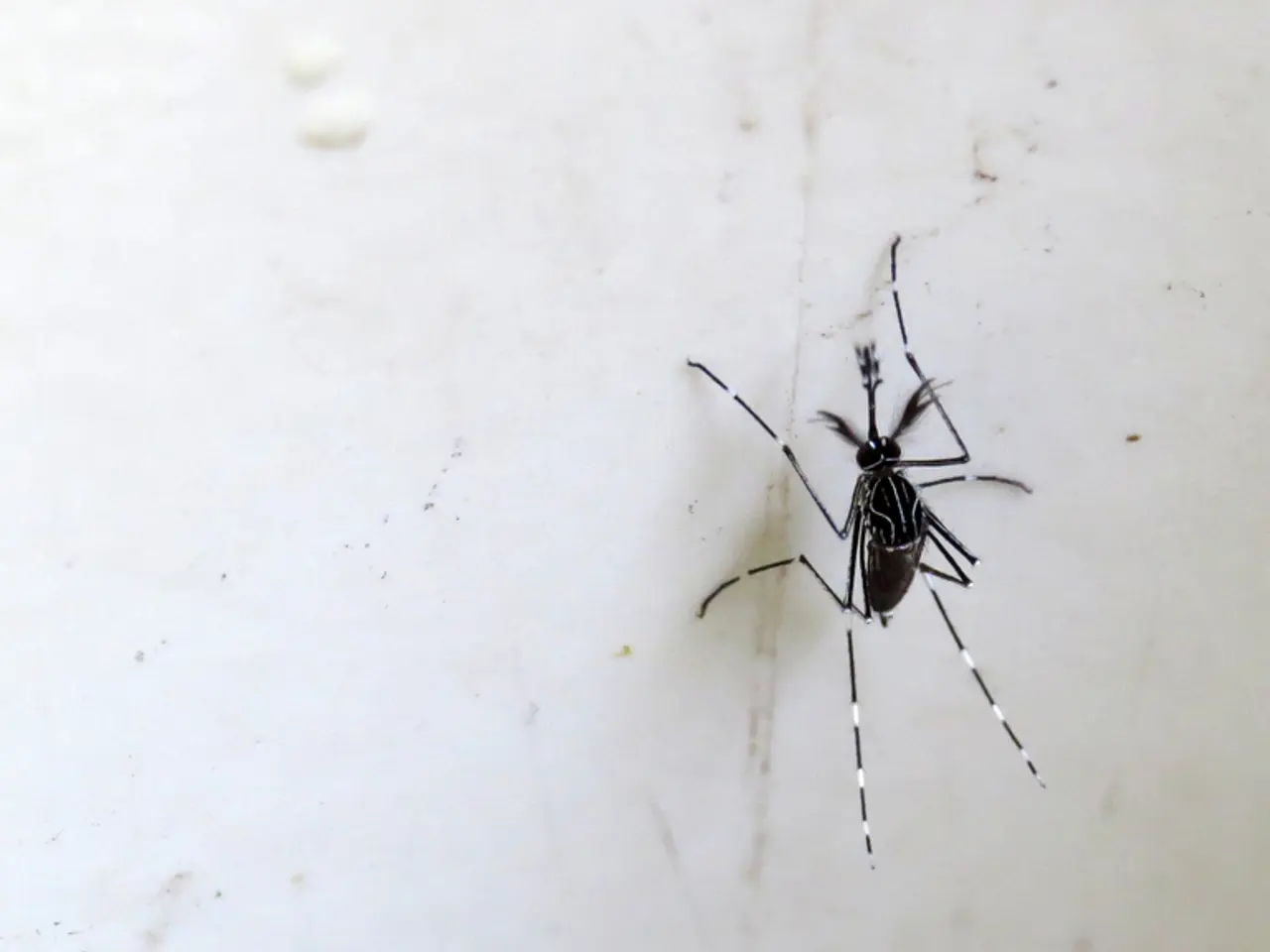Monitoring Mosquito-Carried Ailments like West Nile Virus, Chikungunya, and Dengue Fever Throughout Europe
Europe is currently experiencing an increase in mosquito-borne diseases, with the European Centre for Disease Prevention and Control (ECDC) reporting nearly 470 cases of West Nile virus, chikungunya, and dengue so far this year.
The common mosquito types that spread these diseases are becoming increasingly prevalent in Madeira, Cyprus, the Black Sea, and a large part of Europe. Chikungunya, in particular, has been established in a significant portion of the continent.
France has reported 111 chikungunya cases this summer, with 16 active clusters of infection still ongoing. Italy has recorded seven cases, while Portugal and Italy each have reported two cases of dengue.
Chikungunya can cause symptoms such as fever, nausea, headache, fatigue, rash, muscle aches, joint swelling, and joint pain. Although severe symptoms and death from chikungunya are rare, babies and older adults are at higher risk.
West Nile virus has claimed at least 10 lives in Italy this year, with most cases among men aged 65 and older. The virus has been reported in eight European countries, including Italy, Greece, Serbia, Romania, France, Hungary, Spain, and Bulgaria.
While there are two chikungunya vaccines approved in the EU, there are no specific treatments for either West Nile virus or chikungunya.
To combat these diseases, a combination of strategies is essential. Eliminating mosquito breeding sites, protecting individuals from bites, enhancing surveillance, and scaling up public health responses tailored to local risks are key approaches.
Eliminating mosquito breeding sites involves removing or covering standing water where mosquitoes lay eggs, such as flower pots, gutters, old tyres, and water containers near homes. Personal protection against mosquito bites includes using insect repellents, wearing long-sleeved shirts and trousers, and employing physical barriers like window screens, bed nets, air conditioning, or fans.
Public health surveillance and guidance are provided by European authorities, led by the ECDC, who offer timely surveillance and practical toolkits to assess risk and deploy tailored control measures for diseases like West Nile virus and chikungunya. Special caution should be taken by high-risk groups, such as the elderly, children, and immunocompromised individuals.
People returning from regions with active mosquito-borne viruses may be required to wait before donating blood to avoid transmission through transfusion. Vaccination developments for chikungunya virus disease are underway and may enhance prevention in the future.
As European summers grow longer and warmer with milder winters, the mosquito season extends, so control measures must adapt and be sustained to match this shifting risk. Addressing climate and environmental changes is crucial in the fight against mosquito-borne diseases in Europe.
In summary, preventing mosquito-borne diseases in Europe during summer revolves around controlling mosquito habitats, protecting individuals from bites, enhancing surveillance, and scaling up public health responses tailored to local risks.
- Science and environmental studies are crucial in understanding the spread of mosquito-borne diseases in Europe.
- The prevalence of these insects in Madeira, Cyprus, the Black Sea, and other parts of Europe requires immediate attention.
- Chikungunya has spread significantly across the European continent, posing a serious threat to public health.
- France, Italy, Portugal, and many other European countries are experiencing an increase in chikungunya cases this year.
- West Nile virus has resulted in several deaths, primarily affecting older men, across multiple European countries.
- Despite approved EU vaccines for chikungunya, there are no specific treatments available for this disease or West Nile virus.
- Eliminating mosquito breeding sites, an essential strategy for combating these diseases, involves managing standing water around homes.
- Using insect repellents, wearing protective clothing, and employing physical barriers can help protect individuals from mosquito bites.
- European authorities like the ECDC offer guidance and practical tools for risk assessment and control measure implementation.
- High-risk individuals, such as the elderly, children, and immunocompromised persons, should remain vigilant during this mosquito season.
- People returning from affected regions may be required to wait before donating blood to prevent the transmission of viruses through transfusion.
- The extension of the mosquito season due to warmer European summers and milder winters necessitates adaptable and sustained control measures.
- Addressing climate change and environmental issues is crucial in the long-term fight against mosquito-borne diseases in Europe.
- Workplace-wellness programs should include education on mosquito-borne diseases, their prevention, and symptoms to watch for.
- Medical conditions, such as autoimmune disorders and chronic diseases, may weaken a person's immune system, making them more susceptible to mosquito-borne illnesses.
- Cancer patients and individuals with respiratory or digestive health problems should also be aware of the increased risk they face.
- Eye-health, hearing, and skin-care issues should not be overlooked in discussions about mosquito-borne disease prevention.
- Mental-health, men's health, and women's health are equally important in understanding the overall impact of these diseases on European populations.
- Fitness and exercise, sexual health, and nutrition play significant roles in maintaining overall health and resilience against mosquito-borne diseases.
- Therapies and treatments for various medical conditions and health issues can help lower an individual's risk of complications from mosquito-borne diseases.
- Aging can weaken the immune system, making older adults more vulnerable to mosquito-borne diseases.
- Proper care and management of weight, cardiovascular health, and skin conditions can help mitigate the effects of mosquito-borne diseases.
- As research advances, new treatments and vaccines may become available for combating mosquito-borne diseases and other medical conditions.
- Other environmental science concerns, such as climate change, manufacturing, and retail industries, can impact the spread of mosquito-borne diseases in Europe.
- Finance, energy, and the finance industry play a role in funding research and developing measures to combat mosquito-borne diseases.
- Entrepreneurship and small businesses can create innovative solutions to address the mosquito-borne disease challenge in Europe.
- As leaders in their industries, organizations and individuals must promote diversity and inclusion to ensure that all communities have equal access to mosquito-borne disease prevention and care.




